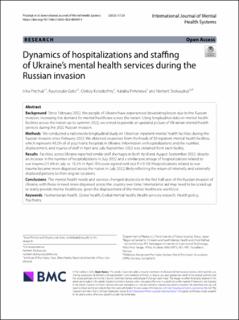Dynamics of hospitalizations and staffing of Ukraine’s mental health services during the Russian invasion
Peer reviewed, Journal article
Published version
Permanent lenke
https://hdl.handle.net/11250/3100444Utgivelsesdato
2023Metadata
Vis full innførselSamlinger
- Institutt for psykisk helse [1216]
- Publikasjoner fra CRIStin - NTNU [37703]
Originalversjon
International Journal of Mental Health Systems. 2023, 17 (1), . 10.1186/s13033-023-00589-4Sammendrag
Background
Since February 2022, the people of Ukraine have experienced devastating losses due to the Russian invasion, increasing the demand for mental healthcare across the nation. Using longitudinal data on mental health facilities across the nation up to summer 2022, we aimed to provide an updated picture of Ukrainian mental health services during the 2022 Russian invasion.
Methods
We conducted a nationwide longitudinal study on Ukrainian inpatient mental health facilities during the Russian invasion since February 2022. We obtained responses from the heads of 30 inpatient mental health facilities, which represent 49.2% of all psychiatric hospitals in Ukraine. Information on hospitalizations and the number, displacement, and injuries of staff in April and July-September 2022 was obtained from each facility.
Results
Facilities across Ukraine reported similar staff shortages in both April and August-September 2022, despite an increase in the number of hospitalizations in July 2022 and a similar percentage of hospitalizations related to war trauma (11.6% in July vs. 10.2% in April, Wilcoxon signed-rank test P = 0.10). Hospitalizations related to war trauma became more dispersed across the nation in July 2022, likely reflecting the return of internally and externally displaced persons to their original locations.
Conclusions
The mental health needs and services changed drastically in the first half-year of the Russian invasion of Ukraine, with those in need more dispersed across the country over time. International aid may need to be scaled up to stably provide mental healthcare, given the displacement of the mental healthcare workforce.

